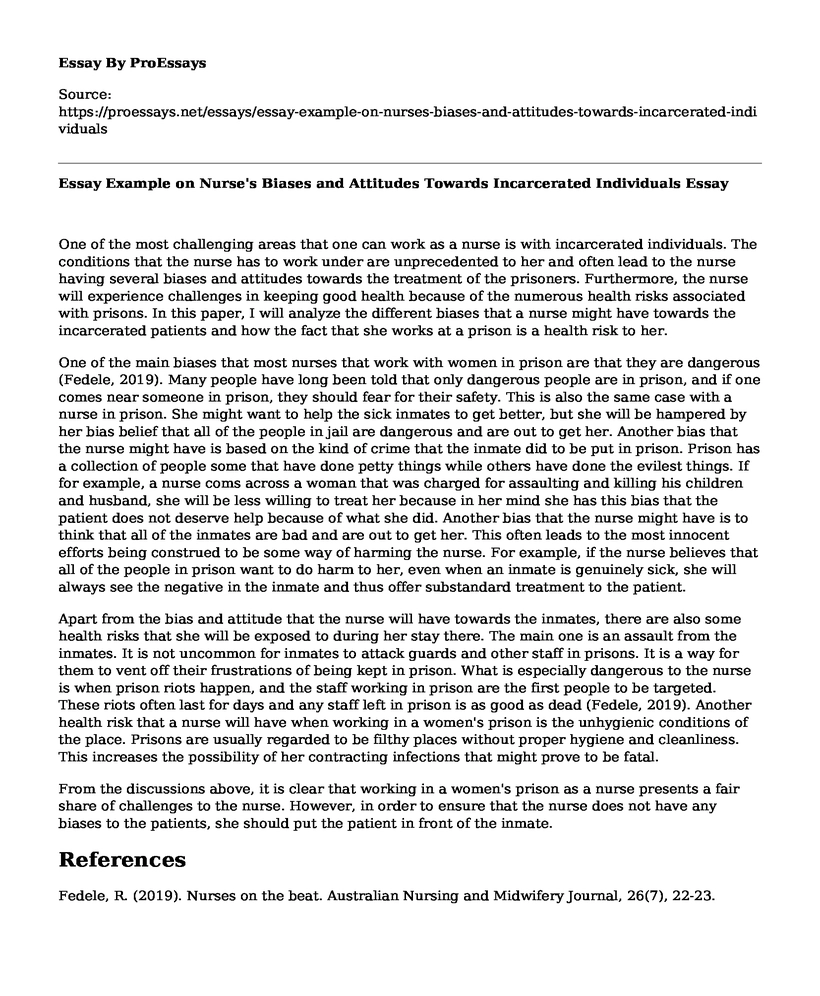One of the most challenging areas that one can work as a nurse is with incarcerated individuals. The conditions that the nurse has to work under are unprecedented to her and often lead to the nurse having several biases and attitudes towards the treatment of the prisoners. Furthermore, the nurse will experience challenges in keeping good health because of the numerous health risks associated with prisons. In this paper, I will analyze the different biases that a nurse might have towards the incarcerated patients and how the fact that she works at a prison is a health risk to her.
One of the main biases that most nurses that work with women in prison are that they are dangerous (Fedele, 2019). Many people have long been told that only dangerous people are in prison, and if one comes near someone in prison, they should fear for their safety. This is also the same case with a nurse in prison. She might want to help the sick inmates to get better, but she will be hampered by her bias belief that all of the people in jail are dangerous and are out to get her. Another bias that the nurse might have is based on the kind of crime that the inmate did to be put in prison. Prison has a collection of people some that have done petty things while others have done the evilest things. If for example, a nurse coms across a woman that was charged for assaulting and killing his children and husband, she will be less willing to treat her because in her mind she has this bias that the patient does not deserve help because of what she did. Another bias that the nurse might have is to think that all of the inmates are bad and are out to get her. This often leads to the most innocent efforts being construed to be some way of harming the nurse. For example, if the nurse believes that all of the people in prison want to do harm to her, even when an inmate is genuinely sick, she will always see the negative in the inmate and thus offer substandard treatment to the patient.
Apart from the bias and attitude that the nurse will have towards the inmates, there are also some health risks that she will be exposed to during her stay there. The main one is an assault from the inmates. It is not uncommon for inmates to attack guards and other staff in prisons. It is a way for them to vent off their frustrations of being kept in prison. What is especially dangerous to the nurse is when prison riots happen, and the staff working in prison are the first people to be targeted. These riots often last for days and any staff left in prison is as good as dead (Fedele, 2019). Another health risk that a nurse will have when working in a women's prison is the unhygienic conditions of the place. Prisons are usually regarded to be filthy places without proper hygiene and cleanliness. This increases the possibility of her contracting infections that might prove to be fatal.
From the discussions above, it is clear that working in a women's prison as a nurse presents a fair share of challenges to the nurse. However, in order to ensure that the nurse does not have any biases to the patients, she should put the patient in front of the inmate.
References
Fedele, R. (2019). Nurses on the beat. Australian Nursing and Midwifery Journal, 26(7), 22-23.
Cite this page
Essay Example on Nurse's Biases and Attitudes Towards Incarcerated Individuals. (2023, Jan 29). Retrieved from https://proessays.net/essays/essay-example-on-nurses-biases-and-attitudes-towards-incarcerated-individuals
If you are the original author of this essay and no longer wish to have it published on the ProEssays website, please click below to request its removal:
- Critical Analysis of Smoking in Public Areas Essay
- Essay Sample on Racial Profiling In Peel Region Ontario
- Essay on Rising Knife Crime in England and Wales: Analyzing the Stats
- Essay Example on Maximizing Care for the Aged: The Need for Medicare and Social Security
- Essay Example on Is E-Cigarette Smoking as Harmful as Tobacco?
- COVID-19: A Deadly Respiratory Disease Spreading Fast - Essay Sample
- Right to Counsel for Illegal Immigrants: A Human Right - Free Paper Example







